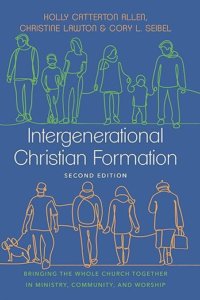How can bringing different generations together in worship, learning, and community promote faith formation? Holly Allen discusses the benefits of a more intergenerational approach to ministry and strategies for helping young and old journey together in faith.
Watch the interview video on YouTube, listen to this interview, or continue reading.
Ann Michel: You have written a book, Intergenerational Christian Formation: Bringing the Whole Church Together in Ministry, Community, and Worship, with co-authors Christine Lawton and Cory Seibel. It makes a very strong case for intergenerational worship, fellowship, learning, and service. Yet in so many churches, this isn’t the current practice. Why is the paradigm of age-specific ministries so prevalent in North American churches?
Holly Allen: It hasn’t always been that way. Probably in the 70s, we began dividing the generations. First, perhaps in youth ministry, then later in children’s ministry, and then we began to separate more and more. Senior ministry probably came next. Now we have singles ministries, emerging adult ministries, and college ministries. Most churches have worked out of an age-segregated paradigm for at least half a century. For the parents now in the pews, it’s all they’ve ever known. So, it’s a little bit hard to shift on them.
But how did we get here? There were several reasons, but I’ll highlight a few. First, in the 70s and 80s, church growth strategists promoted the idea that people like to be with people like themselves. There was also a move toward age segregation in society in general. The general cultural influence said, “Let’s put all the four-year-olds together. Let’s put all the 20-year-olds together.” We really are fairly age segregated across most of society. Churches are one of the few places that have been intergenerational until the last few decades.
But in the 1970s and 80s, when I brought children’s church to our church, what influenced me most was developmental psychology. Piaget’s world, the idea that each segment needs to have only what they need cognitively. Little children are intuitive thinkers. Later, they mature into concrete thinkers, and later abstract thinkers. So, I bought into the idea that we shouldn’t do anything abstract for kids under, say, 12, 13, or 14. I thought, “We shouldn’t have our children in the regular Sunday worship. We should be teaching them at their own level.” I was a teacher. I came from the world of educational psychology. It all made sense to me. But I didn’t run it past enough grids, nor did the people who were teaching me. It was probably in 1990s when I said, “Oh wait. Maybe cognitive development is not exactly the same as spiritual development.” Teaching facts about the Bible is not the same as helping children and all of us come to know God. I think we just went too far down the developmental line. As Ted Ward said, “Our theology for doing ministry has been developmental psychology.” Anyone can look at that and see there’s probably something wrong here.
There is another factor I have only just been reading about, but I should have figured it out sooner. For at least 30 or 40 years, the marketing world has been in the business of saying to each generation, “You are unique. You have unique needs. We have something special just for you because you’re not like anybody else.” As a culture, we bought into that idea. As individuals and as churches, we also bought into the idea that our generations are so different that we need to give them something special just for them.
Yes, we’re all unique, but spiritually it’s really one journey. When it comes to spiritual development, it’s not quantitatively or qualitatively different for a four-year-old to an 80-year-old. Now, an 80-year-old can maybe express themselves differently. They can talk more articulately about what’s been happening spiritually than a four-year-old. But who’s to say the four-year-old has not been experiencing some of the same things? We’re coming to understand that even infants perhaps experience many spiritual things that they cannot exactly express. We’ve also broadened our understanding of what we mean by “spiritual.” It’s not simply “God/person.” It’s “person/self,” “person/others,” “person/God.”
But it’s important for me to say, I’m not against age specific ministry. There are big things that happen in age-specific ministries that are harder to do in a cross-generational setting. So, I’m not against them. It’s both/and not either/or.
Ann Michel: Could you highlight a couple of the benefits that accrue from a more intergenerational approach to faith formation?
Holly Allen: I think a sense of belonging is probably one of the most important things. You can really belong to your youth group and feel very welcome. Yet, after you graduate from high school or go to college and you come back, that youth group is not there. So where do you belong? You might not have even ever worshiped with the whole body of Christ if you had a youth group who did their own worship, and you had a children’s church before that. Belonging is one of those deep-seated needs that everybody has. So, belonging is a big benefit psychologically, but I think it’s of God as well. The sense that these are my people, this is my village, this is where I belong.
Another benefit is having people ahead of you that you know and can ask, “What does it look like to be a twenty-something single person, not married, and starting your career without a family? What does that look like? How do you follow Jesus?” High schoolers and college students are saying, “What does that next stage look like?” In a church where the generations are together there are models and mentors. We get to join people on their spiritual journeys, all up and down the age ranges. You aren’t just traveling your own little journey. You’re tapping into other people’s spiritual journeys, younger and older, and that is the most precious thing. It should be this way.
Ann Michel: How can intergenerational ministry take shape in churches of different sizes, particularly in larger churches that are known for having a broad array of ministry opportunities.
Holly Allen: One of the strengths of megachurches is that they have something for everyone. They can run a whole special needs ministry that can really help those families. I just love that. They’ve led the way in saying, “Look, we have a fabulous children’s ministry. No matter where you are on the generational spectrum, we have something for you.” They can hire 50 people to make sure that wherever you are in the journey, they have something for you. That’s a strength in many ways. Yet, every time very we host “Intergenerate,” a big conference we hold every other year, some megachurches send their whole staff because they’re saying, “We’ve got to figure this out.”
Desegregating megachurches generationally can be a big challenge. So, how do you do it? First, it’s important to get everybody on board. When you get your whole ministry staff together and start talking about this, it takes a year or two for them to figure out what you’re talking about and how it might look for them. They’ve been hired to be the children’s minister or the youth minister or the seniors minister. They’re saying, “What? Are you saying we aren’t going to do everything I was trained to do?” But, of course, that’s not true. We’re not going to give it all up.
The easiest way to become a little bit more intergenerational is to challenge every ministry to plan their next event and invite one more generation in. If the elementary school is doing something, invite the seniors. Or invite the emerging adults. They remember being kids, how fun is that? Just one more generation. Say, “Come join us. We would love to have you with us.” That’s fairly easy and it’s usually very successful so it gives you some successful cross-generational experiences to build on.
Ann Michel: Your book examines the Bible, generational theory, developmental theory, the major sociological research on ministry with children and youth — and it all seems to point to the advantages of intergenerationality. But I wondered, are there counter arguments? Where are the challenges and the obstacles?
Holly Allen: There are challenges, of course. First, the ministers that are in our churches today were not trained for intergenerational ministry. So, just bringing the ministry staff on board can be a huge challenge when they’ve spent their whole life thinking of their ministry in a certain way. So, the challenge is training our children’s ministers, youth ministers, small groups, and education ministers toward a more intergenerational approach.
Then the larger challenge is, how do you bring the church along? Most of the people in the pews have done separated ministries most of their lives. So, this is deep, adaptive change. How do you gently lead those in the pew who have been generally content with this aspect of church to adopt a new paradigm. The church leadership, including the senior pastor and all the other ministries, need to have a really deep understanding and be committed to it. It takes passionate, committed leadership to move toward becoming intentionally intergenerational.
If you’re just one person with this new idea, even if you’re the senior minister, you need a team. You cannot do it on your own. So, you pull in the whole ministry staff. One at a time, if necessary, over a period of months. Then you find other advocates, those who are early adopters of new ideas. There’ll be people who go, “Oh, I’ve always thought that. I think that’s cool.” Bring them in, get them on that team so you have a lot of voices saying some of the same thing.
Probably the thing we do most poorly is we do not communicate well. You have to make a case for it. You don’t just get up and say, “we’re going to do this,” and everybody goes, “Yay, let’s do it.” It takes preparation, teaching, experiencing, exampling, doing some reading. Once people have a little experience with a more intergenerational approach to ministry they say, “That was nice. I like that.” They find out it’s not so weird.
Ann Michel: Your book covers many different practices that can be used in intergenerational ministry. One that really stood out to me was the idea of storytelling as a vehicle of intergenerational ministry. What is that like? And why it’s an important piece of intergenerational faith formation.
Holly Allen: It may be the most central piece. I think we have generally lost the art of storytelling, and rarely do we have opportunities to hear stories across the generations. But as I mentioned earlier, the best way to learn to live life under Jesus is to hear from people who are a little further ahead on the journey. And hearing the stories of successes and failures. How do you succeed as a CEO and follow God? How do you fail miserably? How do you survive bankruptcy? Divorce? How do you stay faithful to a child who has been utterly defiant, and has thrown everything in your face? We need to hear our children’s stories. We tend to think “Well, after they’ve had some things happen, we can hear from them.” But their stories are as spiritually rich as ours. The needs they have. The fears they have. The struggles they have are just as important and we need to hear their stories and affirm that God is indeed at work in them. It can be very encouraging for all of us.
Bringing scripture into any intergenerational setting can be hard because we’re so convinced that it’s not going to work across the ages. But one way to do this is through a “story prompt.” An example I’ve used many times is based on 1 Samuel 17:37: “The God who delivered David from the paw of the lion and the paw of the bear, will deliver me from the hand of the Philistine.” So, you take that passage and reframe it, and you ask the people in your small group or your class to finish this prompt: The God who delivered David from the paw of the lion and the paw of the bear and from Goliath, is delivering me from ….
I can share three or four two-sentence stories. These are all real stories. A seven-year-old boy said: “God who delivered David from the bear and the lion and from Goliath has delivered me from my nightmares. My small group prayed over me, and every night I remember Psalm 4:8, and God has kept me from waking up in fear.” A 15-year-old girl said: “God who delivered David from the bear and the lion and from Goliath has delivered me from an abusive home situation. I am now in a safe place. God has made me safe.” A 24-year-old-single woman said: “God who delivered David from the bear and the lion and from Goliath, is delivering me from hopelessness. I was trapped in a life of promiscuity, seeking from men what only God could give. As I have studied the word of God in the lives of Rahab, Esther, Tamar, Ruth and Deborah and Lydia and Mary, God is bringing me to a place of hope and peace. A place I thought I could never be.” These are powerful stories.
I’ve got several other story prompts listed in the book that have worked well in the past. Children are able to do this. They don’t say, “I don’t know what you mean.” They do know what you mean.
Ann Michel: Looking beyond the issue of intergenerationality, are there other trends you see in terms of faith formation more generally?
Holly Allen: Yes. I grew up under a very cognitive approach. We just learned the stories. “Ten lepers. Jesus healed all ten. One came back and said, ‘thank you.’” How are we supposed to act? We’re supposed to be grateful. I learned the stories. I learned the books of the Bible and the verses. But I did not know that our purpose was to know who God is. I thought the end goal was to learn the Bible story. I taught children and anybody else the Bible so they would know how to live. Now, in the last 20 years, I’ve been teaching so people know God. That’s a different enterprise, and it’s a different enterprise across the whole age spectrum. All the adult Sunday school classes I was in would focus a lot on context, geography, and cultural trends. Not bad things. Then at the end, you’d read the Bible verse or chapter and ask, “What do we need to get out of this?” We should have been asking, “Who is God? How is he calling us? What is God saying to us here?” Those are different questions. In the last few years, we’ve been shifting toward that in the setting I’m in. We’re helping to train new ministers to go in that direction. I would say it looks a little bit more like spiritual disciplines.
Also, I think churches in general are moving toward a more relational, more affective approach. But sometimes when we go down that relational, affective route, it’s all about “how do you feel?” and, “what’s your number on the Enneagram?” and, “how are you managing life?” Those are all perfectly appropriate questions, but we need to stay as close to scripture as we can because there’s no other place in our life where we do that.
 Related Resources
Related Resources
Intergenerational Christian Formation: Bringing the Whole Church Together in Ministry, Community, and Worship, Second Edition. (Intervarsity Press, 2023) by Holly Catterton Allen, Christine Lawton, and Cory L. Seibel is available at Intervarsity Press, Cokesbury, and Amazon.
Related Resources
- Intergenerational Ministry for the Post-pandemic Church by Doug Powe
- Why Making Your Church Multigenerational Is Worth the Effort by Chuck Lawless
- Intergenerational Ministry and the Small Church by Brandon J. O’Brien
Photo by laterna magica on Lightstock.







